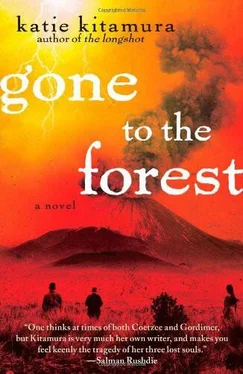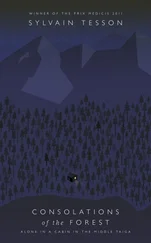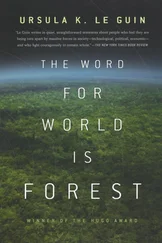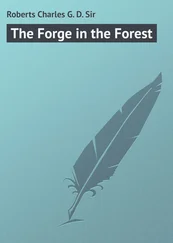Katie Kitamura
Gone to the Forest
I have gone to the forest.
— KNUT HAMSUN
Tom hears the noise from across the hall. A quick stream of native patois. At first he thinks it is the servants talking. But then he hears the crackle of static. The high cadence of a bugle. The voice picks up again and is louder. Agitated and declaiming.
It is the radio — somebody has left the radio on. Tom gets to his feet. The old man is not in his study, he is out by the river. But the noise is not coming from the old man’s study. Tom follows the sound down the corridor. He goes to the kitchen, thinking perhaps Celeste has been listening to the afternoon drama—
The kitchen is empty. The dishes sit washed and gleaming on the shelves. A drip of water from the tap. Perplexed, Tom turns around. The voice continues to speak from somewhere behind him. He follows the sound to the veranda. There, a radio sits on the edge of the table, the volume turned high.
Brothers, our time has come. We are tired of being ground under the boot of the white oppressor. We are tired of being suffocated by these parasites. For so many years we have not even been aware of their tyranny. We have been sleeping!
A chair has been pulled up to the table. As if someone has been sitting and listening intently. Tom does not immediately recognize the radio — he thinks it has been taken from the library, he cannot be sure. On the farm, they do not often listen to the wireless. Impossible to understand why it is here on the veranda.
Now it is time for us to awaken from our slumber. Rouse up, brothers! We will achieve our liberation and we will free this land! There will be a price. The parasites will not give up this country so easily. But we are brave, we are righteous men—
Tom frowns and switches the radio off. It is unusual to hear a native voice on the radio. The patois is thick and filled with anger. He can barely understand the words, it is a guttural nonsense to his ears. He still cannot imagine who could have moved the radio to the veranda. No servant would have dared do such a thing.
He looks at the chair. He thinks he can see an indentation in the seat. Like a ghost has broken into the farm, and in broad daylight, too. It is a good thing he was the one to discover it. Tom looks both ways before adjusting the chair and picking up the radio. Holding the machine, he looks out onto the land. It is quiet and he retreats inside.
THE HOUSE SITS by the edge of the river. It is big — a house with multiple wings and rooms and a veranda running along three sides. Outside this giant house there is a double row of trees, planted by the old man’s natives. Tom sits in the dirt beneath one of these trees, where there is shade from the blistering sun.
Tom’s father was among the first of the white settlers. Forty years ago, the old man arrived in the country and claimed his piece of land. One hundred thousand acres down a ten-mile spine running through the valley. The land belonged to no one and then it belonged to him. A stake driven into the soil. The old man swallowed up the land and filled it with native hands. The money and good fortune came shortly after.
The farm sits adjacent to the border and from its perimeter the neighboring country is visible. The parcel is big and the soil arable and there is also the river, which is wide and fast, clouded with sediment and Sargasso weed. The old man picked the land for the river. It runs straight out to the sea. The carnivorous dorado swim through in herds and purple hyacinth sprout on the surface.
For many years, the old man used the land as a cattle farm. The vast acreage turned to pasture, the herd growing by the year. A small crop also harvested. Today, he runs the farm as a fishing resort, for tourists who come from all parts of the world. The old man is imperious with the guests in the same way he is imperious with his servants. They do not seem to mind. They stay in the guest wing of the house and pay good money for the privilege.
Tom manages the farm. He oversees the daily operation of the cattle pasture, the fields, the river and the house. It is a great deal for one man to handle but Tom is good at his job. He is good with the fluctuations of the land, which he is able to read correctly. Also the domestic affairs of the house and kitchen. Tom is diligent and has an eye for detail, in which he often takes comfort.
Tom is the old man’s first and only son. This means that one day he will inherit the farm. He will run the fishing resort and that will be the whole of his life. Tom can see no other kind of future. It is the only horizon before him, but he has no sense of its constriction. Tom has a passion for the land. It is the one thing he knows intimately. He burrows into it, head down in the dirt, and cannot imagine a life beyond it.
Therefore, Tom sits beneath his tree. He presses his limbs into the soil, as if they would grow roots. It is the last week of the season but it is still hot. Normally, the tourists would have stayed. For the sun and the fishing, and with winter so slow to come. They would have sat on the veranda in friendly clusters, ideal for souvenir photographs. The women in tea dresses and the men in linen suits. Drinks served on the veranda after a hot day on the river.
Instead, the veranda is empty and silent. The radio having been returned to the library and the chair righted. Tom looks up when the door opens. The old man steps out onto the veranda. He is still in his work clothes, having spent the afternoon shooting old livestock. It is a task he always does himself. There are traces of gunpowder on his boots, the smell of fresh blood. The old man stands on the veranda, six feet tall in his riding boots, and does nothing to acknowledge his son.
After a long silence, he calls to him.
“Thomas.”
He is called Tom by everyone except his father, who calls him Thomas. It causes a split inside Tom/Thomas. He thinks of himself as Tom but only recognizes himself as Thomas. He does not know his own name. He realizes, has been aware for some time, that this is no way for a man to be. It is not something he can discuss with his father. He rises to his feet and goes to the old man.
“Yes, Father.”
His father watches him and is silent. He looks at Tom like he has never seen him before in his life. Possibly he wishes it were so. All this land and they cannot get away from each other, though that is not the way Tom sees it. The sun glows orange in the sky. For a long time his father is silent. Then he speaks.
“The Wallaces dine with us tonight.”
“Yes.”
“Have you spoken to Celeste?”
“Yes.”
“Fine.”
The old man nods. On the farm they squander money on food. The youngest animals are slaughtered for the table. Pods stripped from the stalk. Roots upended from the soil. And then there are the tins of foie gras and caviar, the cases of wine that are flown in from abroad. Everything for the kitchen. Anything that could be needed.
Tom turns to go. He is not more than five paces away when something makes him stop. He is already turning when his father calls him again. Tom waits, some distance from his father.
“What is Celeste serving?”
“Tonight?”
His father ignores the question. Tom is immediately uneasy. It is not a normal query. The old man treats Tom like his chief of staff. He manages for the old man, sometimes he allows himself to imagine he is indispensable to him. But he is never able to get used to the idea. There is never the opportunity. The old man does not allow for it.
For example, now. His father is a man of appetite. He trusts Celeste with his stomach and that makes Celeste the most trusted member of the household. But now his father is asking what the menu will be and this is not normal. Fortunately, Tom has discussed the meal with Celeste. He clears his throat — a habit the old man hates — and begins.
Читать дальше










